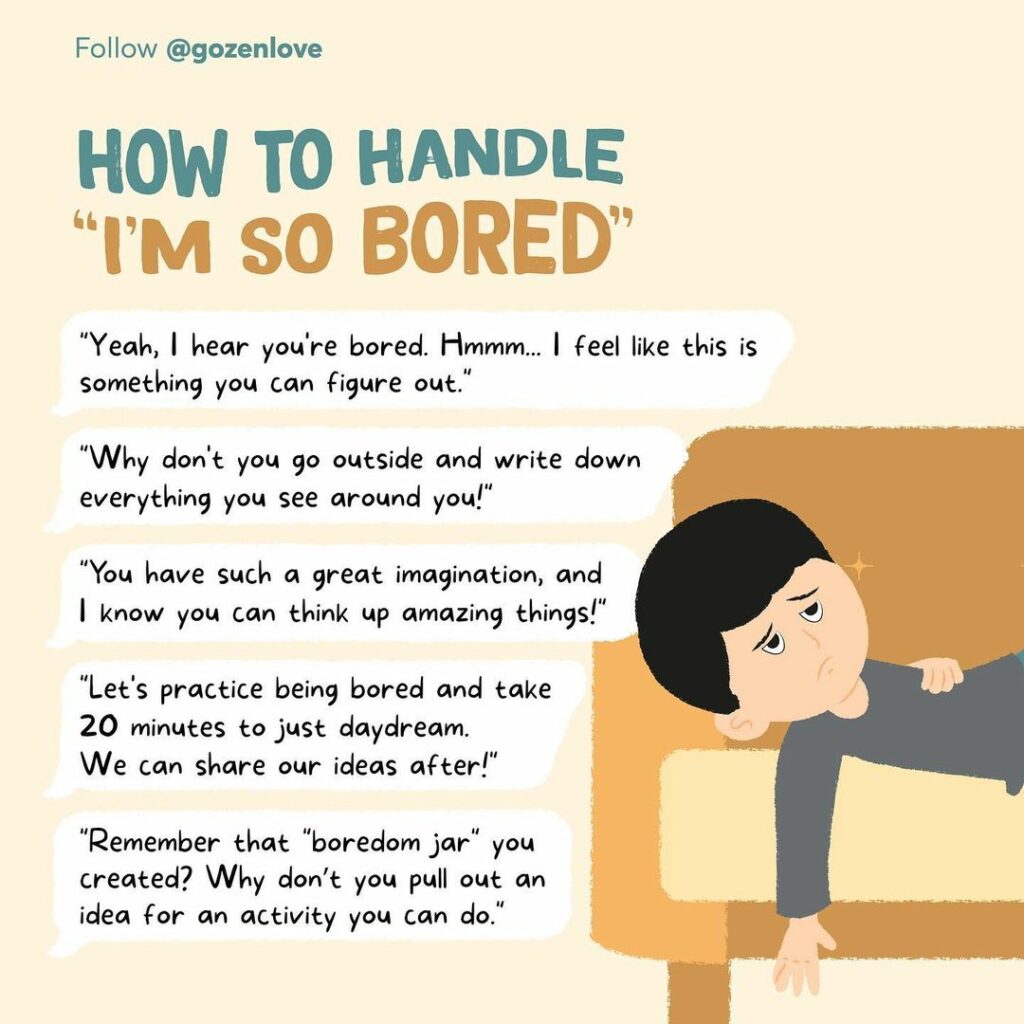It’s easy to feel guilty when you hear your child say they have “nothing to do.” And it’s likely that you’ve felt the urge to come up with something fun for them as if part of our job description is “entertainer!” You may also know that boredom can help cultivate creativity, resourcefulness, and a sense of independence. So, instead of working to immediately quell boredom, try one of these phrases to help your kids problem-solve.

1. “Yeah, I hear you’re bored. Hmmm… I feel like this is something you can figure out.”
When you tell your child that they can handle their boredom on their own, you’re boosting their confidence to use their imagination and try something new. Just be ready: this approach can take some time, especially if your child is used to you running to their aid every time they say that they’re bored. When your child finds something to do, be sure to celebrate them later (don’t interrupt them while they’re occupied), and tuck the idea away for future use (see #5 below).
2. “Why don’t you go outside and write down everything you see around you!”
Not only can a change of environment be a big help for kids who are struggling with boredom, but the act of taking notes about things around them can trigger creativity and help kids see their options. If your kiddo keeps coming back inside, try setting a timer and telling them to write everything they see for ten minutes: they’ll likely come up with something to do in that time. If you have more than one bored kiddo, make it a competition–send them outside together and see who can write down the most objects that they see.
3. “You have such a great imagination, and I know you can think up amazing things!”
If your child struggles with finding things to do on their own, likely, they don’t have a high level of confidence in their own imagination. Reassuring your child that they’re great at coming up with new ideas can help them realize that they can solve the problem of being bored on their own. Sharing examples of your own imaginative childhood ideas (like how you used blankets and pillows to build forts at home) can help your child see that developing an imagination takes time and practice.
4. “Let’s practice being bored and take 20 minutes to just daydream. We can share our ideas after!”
Get that timer out again! There’s no doubt about it: any activity that allows you a minute to clear your head as a parent is a good idea. Today’s kids are used to a constant stream of entertainment, so modeling what it’s like to simply sit and daydream is a smart way to help your kid manage boredom (and give yourself a break). Be sure to come up with some fun things to talk about with your kiddo at the end of the 20 minutes. Then ask them to try it again on their own, and follow up on their ideas with action.
5. “Remember that ‘boredom jar’ you created? Why don’t you pull out an idea for an activity you can do.”
This one takes a little prep work, but it’s well worth it! Remember that idea we squirreled away after #1? Take that, and any other ideas you and your child can come up with together, and create a “boredom jar.” Cut up slips of paper, and write an activity (going for a walk, creating a healthy snack, playing with a pet) on each slip of paper. When your child is bored, ask them to choose a slip out of the boredom jar. If your child responds that they don’t want to do the activity in the boredom jar, them ask them to come up with five new ideas for the jar, and choose one of them to do next.